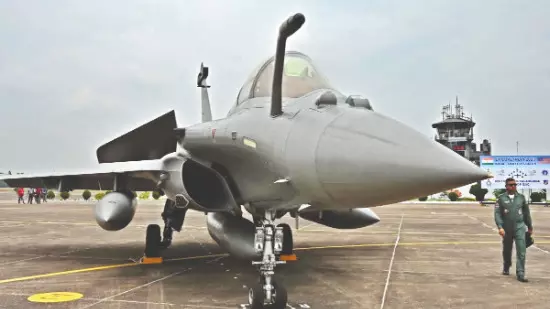India signs Rs 63,000 crore contract for 26 Rafale-M naval fighter jets

New Delhi: In a bid to boost India’s maritime strike abilities, the Cabinet Committee on Security (CCS) on Wednesday cleared the acquisition of 26 Rafale-M multirole fighter aircraft for the Indian Navy.
The Rs 63,000 crore - worth deal is a historic purchase that will boost naval operations as the Indo-Pacific region witnesses growing security concerns.
The Rafale-M, being a naval variant of the France’s Dassault Aviation company-produced multirole fighter aircraft, will be launched from India’s two aircraft carriers, INS Vikramaditya and INS Vikrant indigenously built.
Being commissioned for fulfilling India’s immediate carrier-capable fighter need, the aircraft feature latest-generation electronic warfare technology and also carry nuclear payload. The purchase also involves cutting-edge weapons, most probably to include the Scalp and Meteor missiles, as well as spares, simulators, logistics support, and pilot training facilities.
At the same time, the decision further usher conflict, pointing out that the Rafale-M addresses a vital capability gap while indigenous alternatives such as the Twin Engine Deck-Based Fighter (TEDBF) are still in the development stage. As per reports, the initial squadron is likely to arrive between 2027 and 2028, with Dassault likely to integrate important logistical and operational lessons from its 2016 agreement with the Indian Air Force (IAF) for 36 Rafale jets.
The agreement has also underscored increased defence ties between India and France, following earlier strategic ventures like the Scorpene submarine programme. In fact the previous Rafale deal was marred by charges of a lack of transparency from the opposition. Responding to this, the government highlighted that the agreement guarantees 60 per cent of its value is brought back into India through offsets in the form of technology tie-ups and joint ventures.
Notwithstanding the strategic significance of the deal, defence experts have underlined that this huge foreign buy could affect India’s indigenous defence production targets.
Though the overall defence budget of the country for 2025–2029 is $415.9 billion, a substantial amount of capital expenditure goes into domestic procurement. In FY25, Rs 1.72 trillion ($21 billion) is allocated for indigenous defence purchases. Experts warn that the cost of the Rafale-M may deflect focus and finances from projects such as the TEDBF or new submarine projects.
However, analysts pointed out that common infrastructure and bulk purchasing of components, as witnessed in previous Rafale deals, may also minimize long-term maintenance costs.
Additionally, while India’s defence policy sets aside 75 per cent of modernisation budgets for indigenous procurement, the purchase of the Rafale-M is perceived as an interim necessity to plug immediate capability shortfalls. Nonetheless, experts also caution that rapid technological advancements in fighter jets may render such bulk purchases less versatile in the long run than phased purchase patterns.
However, as the Chinese Navy extends its reach in the Indian Ocean, Navy authorities are confident that the Rafale-M fleet will greatly strengthen India’s rapid response and deterrent capabilities.



